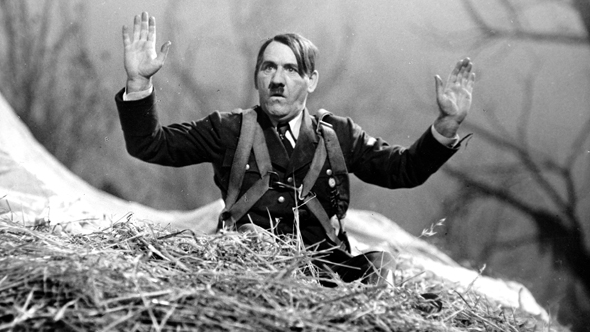
Long before Mel Brooks got everyone laughing at Nazis, a Hungarian-born producer (Alexander Korda) and German-born director (Ernst Lubitsch) somehow persuaded Hollywood to take a major risk at the height of World War II: Combine an espionage thriller with screwball comedy! The resulting film met a decidedly mixed reception in 1942, but over time has become recognized as one of the great movies of the 20th century: To Be Or Not To Be.
The plot: A Polish acting troupe anchored by Maria Tura (Carole Lombard) and her hammy husband Joseph (Jack Benny) have little to concern them other than Shakespeare and ardent fans — too ardent for Joseph in the case of a handsome young admirer of Maria’s (Robert Stack, in his film debut). But their lives, like the film itself, turn gravely serious when the Nazis invade Poland. When the Polish underground is threatened with exposure by a clever double agent (Stanley Ridges), they realize that their theatrical abilities must be called upon to pull off the deceptive performance of a lifetime. Can they fool the Nazis to save the underground, even if one of them has to impersonate you know who? An utterly original combination of adventure and laughter ensue.

This movie could have been a disaster, even offensive, given how it switches from farce to suspense to lightness to moral gravity and back. That it works so brilliantly is a powerful testament to Edwin Justus Mayer’s superb screenplay, a uniformly stellar cast, and Lubitsch’s directorial magic.
Lubitsch died suddenly in 1947 and had less enduring artistic impact than one might expect, perhaps because his comedic and romantic style were seen by post-war filmmakers as dated. But he was remarkably talented (His friend Billy Wilder has a charming explanation here of “the Lubitsch touch”) and his best films remain highly entertaining today. To Be Or Not To Be is particularly impressive because effectively combining such emotionally different tones would challenge a director in any era, but even moreso at a time of national peril (and indeed, some critics and audiences were put off by this film in 1942). I admire how Lubitsch slams down the gas pedal without fear. In particular, I have mentioned a number of times on this site that I appreciate films that don’t dawdle and explain too much at the beginning; on that principle I admire the outrageous, ludicrous, gut busting way Lubitsch starts To Be Or Not To Be.
I can’t end this review without paying tribute to another Hollywood legend. With all the world’s women throwing themselves at him, why did Clark Cable marry Carole Lombard? Asked no one ever. In her last film, she is luminous in her beauty, style, wit, and intelligence. The script gave Benny most of the explicitly funny lines and a tailor-made part, and he’s does well with it. Yet Lombard somehow outshines him just the same. Hollywood lost one of best performers of the era when she tragically died serving the war effort, but she’s still triumphing over her enemies today every time someone else watches this classic film and guffaws at a Nazi’s expense.

